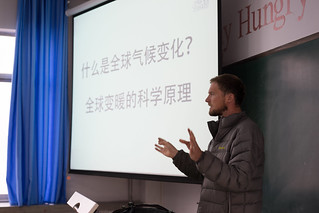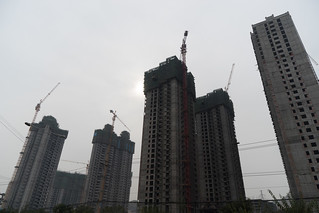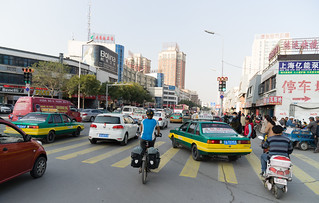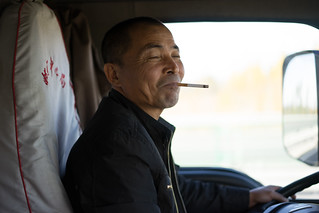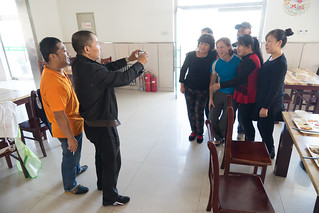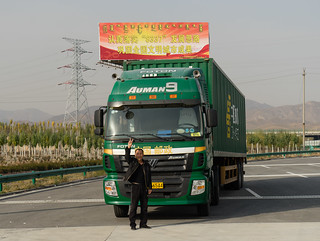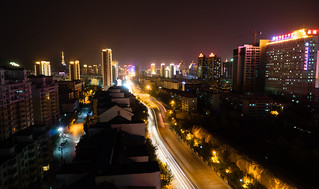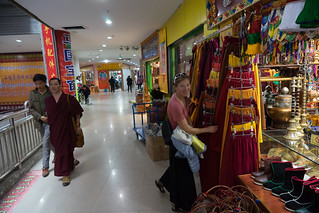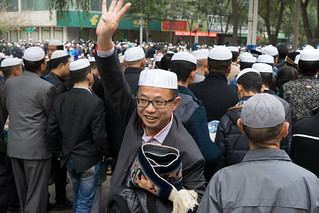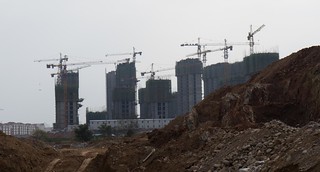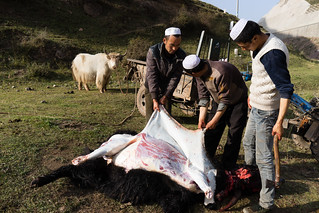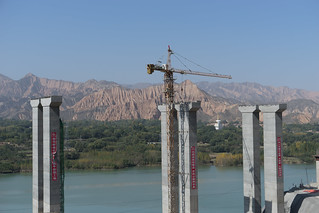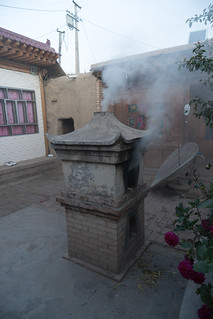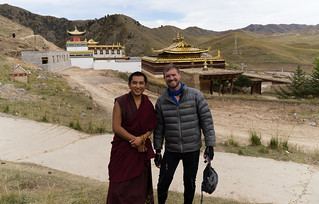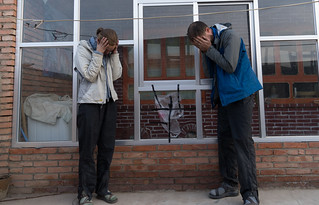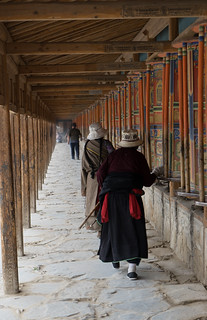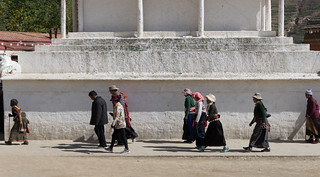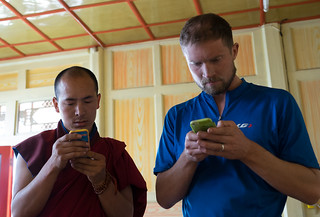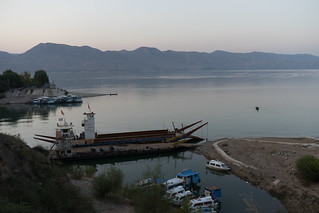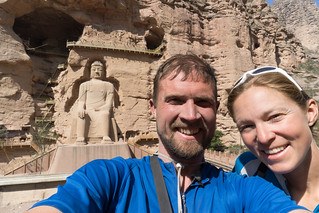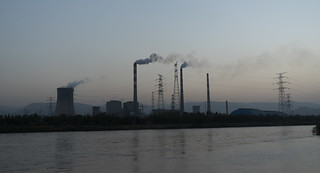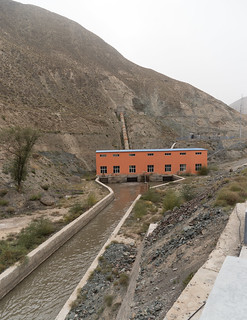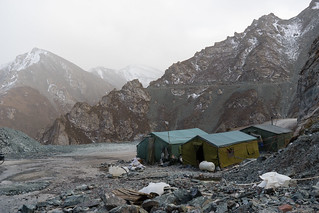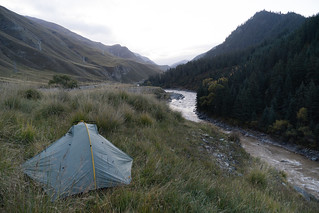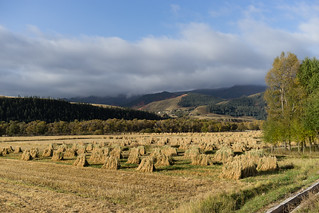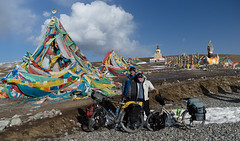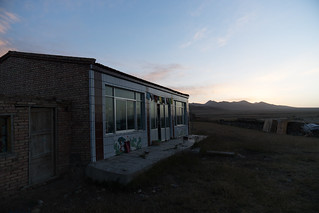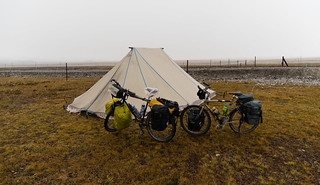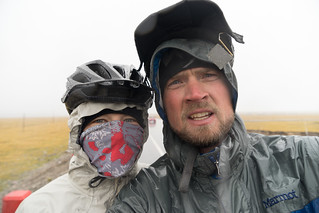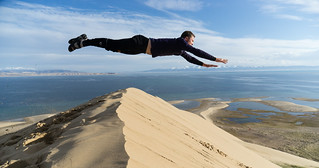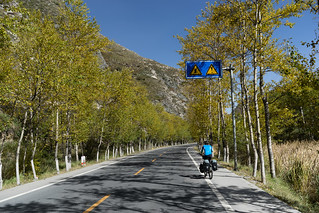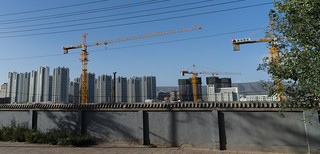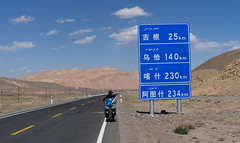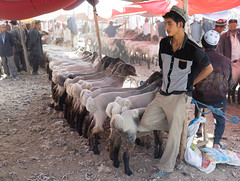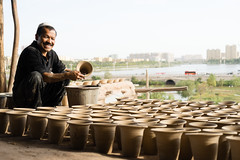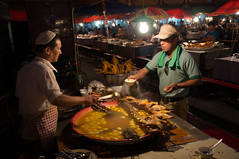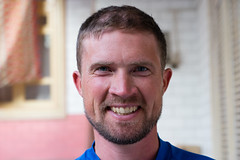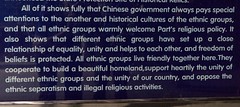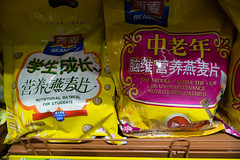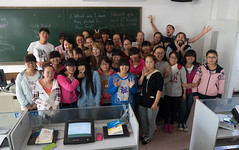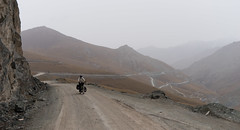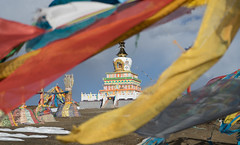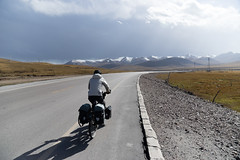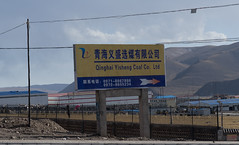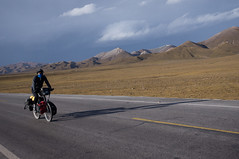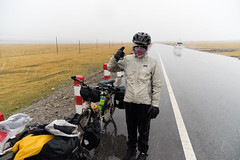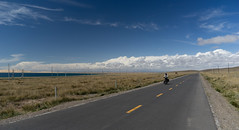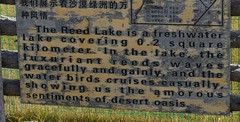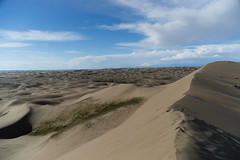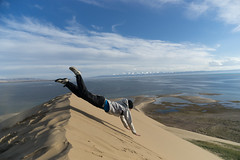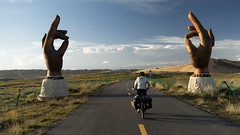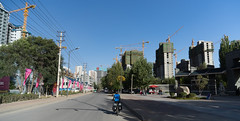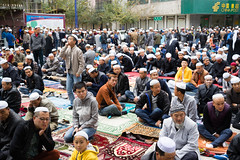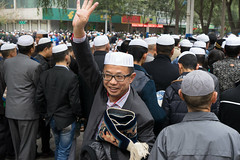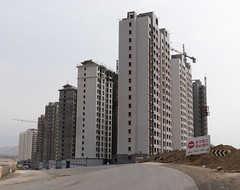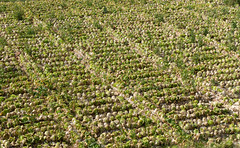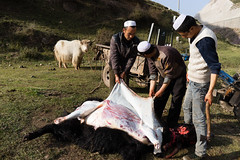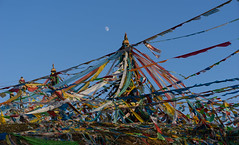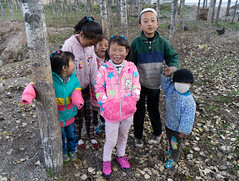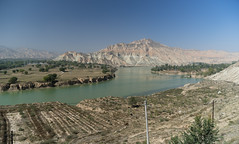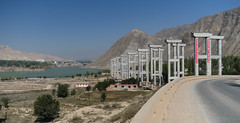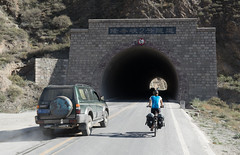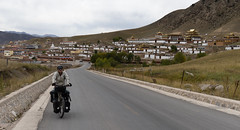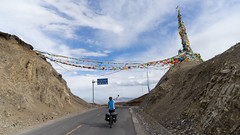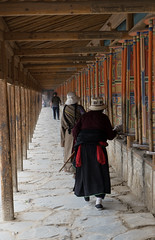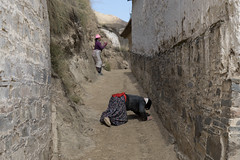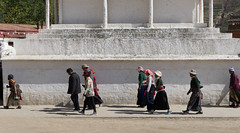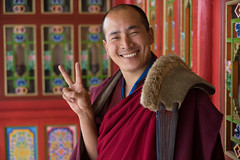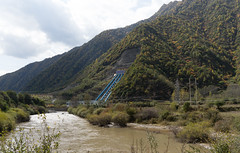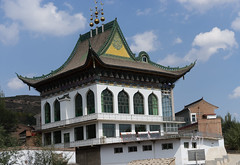In Lanzhou, we left our bikes at the apartment of a Peace Corps volunteer, Jared, and were forced to do something we hadn’t done since we left San Francisco: board a plane. We had to leave the country because our visa, although valid for one year, gives us only 30 days in the country at a time. We had almost used up our 30 days, and to stay any longer in China, we’d have to leave the country and come back. (We had thought we’d be able to extend the visa without leaving, but we then learned this could take a week, be an enormous hassle, and cost well over $100 per person.)
We had an amazing few days in Hong Kong — I have a longer post about it coming soon. The short version is this: After crossing Central Asia and western China, where we subsisted off of Nescafe and yak products, it was fantastic to visit a modern, wealthy city where we could 1) buy high quality replacements for our some of our equipment, and 2) drink a latte every day. We also met with a number of experts about environmental issues in the city, and spoke with pro-democracy protestors, who said many interesting things, but which I won’t post while we’re still in China — it’s a bit controversial here on the mainland. I’ll post our blog about Hong Kong after we leave China (I know this self-censorship is a bit silly, as I doubt any Chinese government officials are reading this blog — if you are, hello! I hope you enjoy these stories about biking across your country. We’ve had a really great time here. We especially like your food. It is delicious. Feel free to send me your email, and I’ll add you to our list so that you can get updates, and not have to troll through this blog for anything negative that we might say about China.)
So, Hong Kong was great.
We returned to Lanzhou, where Jared again let us crash in his apartment, giving us his room while he slept in the common room. Like all Peace Corps volunteers in China (where the program is called the “China-America Friendship Project,” not Peace Corps), Jared teaches English. Like the teachers in Zhangye, he invited us to speak to his students about our journey. In Zhangye, though, the teachers had asked us not to talk about climate change. They worried that a student might report that the class was talking about issues that could make China look bad, which could in turn get them in trouble. The university in Lanzhou, though, seemed to be somewhat more free, and it was apparently fine for us to talk about climate change. “Freedom,” however you define it, seems to be something that varies considerably across this nation, with stricter laws and regulations in some regions than in others. In Lanzhou, we showed the students a slideshow of our journey, which included a short video about climate change in Chinese.
We planned to leave the next day, but I fell sick with a bad cold and couldn’t get out of bed. That is, I could not leave Jared’s bed, as he slept on the couch in the living room while I recovered. His room would be a hazmat zone for the next two days. I don’t really remember much of what happened during these two days, except that when you get sick on a bike tour, it is really, really, really great to have someone to stay with. Jared was an excellent host, and I don’t know what we would have done without his help.
The third day, feeling mostly recovered, we started biking east in the early afternoon. Unfortunately, Lindsey was starting to feel sick, but she felt well enough to ride. Our plan was to bike to the outskirts of Lanzhou and then hitchhike to Baotou, a city about one week of biking away from Beijing.
The air (or “fog,” as Jared said people called it) in Lanzhou was horrible. We biked along the north side of the Yellow River (more brown than yellow), and the buildings rising up on the far side were air brushed grey by the smog. As we cycled out of town, we saw the ubiquitous new construction typical of city outskirts. We also saw bulldozers cutting away a hill — we’ve heard that Lanzhou is flattening a few hundred ‘mountains’ to make way for more city.
If there isn’t a housing bubble in China, I’ll be surprised. We haven’t seen many people living in the countryside — it looks as if most people have already moved to cities. But in the cities there are many empty tall new buildings, and new ones are being built almost everywhere. More than once we saw what appeared to be an entire city under construction. Jared told us that buildings are sometimes demolished after only a few years because codes change and buildings are no longer “up to code” — and may not have been even at the time they were built — so maybe some of the building is in fact “necessary.” It’s also possible that some of the billion people in eastern China will move west, filling these buildings, but it still doesn’t seem economically sustainable. Seeing so many empty structures and new ones under construction definitely makes me worried. Someone out there must be losing a lot of money.
We ended up only needing three rides to cover the 900 kilometers between Lanzhou to Baotou. Hitchhiking is an adventure, and when you pull over and stick your thumb out (or wave your hand, as seems to be the signal here), you have no idea how long you’ll have to wait. It could be a few minutes or many hours. I love this uncertainty. Lindsey does not. (In the past, we’ve resolved this conflict by not talking about it until we are in a hurry, and then having Lindsey express how much she doesn’t like hitchhiking, and me pointing out we don’t have time to do much else — and then we hitchhike. I’m sure we have many years of happy marriage ahead of us.)
Our strategy this time was to bike to the entrance of the expressway — where bikes are not allowed, and find a ride using a note a Chinese cyclist had written for us. It worked the first time, when a man in a small truck stopped after about 30 minutes and drove us about an hour and a half along our route to a town called Bayin. Our driver told us (we think) that we had to bike to another entrance to the freeway if we wanted to continue north. We spent a while trying to communicate, but our Chinese is very limited, and Google Translate on my phone, which worked great in Tajikistan, rarely works very well even though I have a local sim card (this is China’s, fault, not Google’s — China prevents foreign iPhones from using the 3g network, so my phone is slow, and then it’s slowed down further because I have to use a VPN to get around China’s firewall because China blocks all Google websites and services (Google VPN if you don’t know what it is)(hope you’re not in China!)).
The driver wrote us a new note, which we think he told us to show it to the tollbooth operator, who would then help us get a ride. But we don’t know. It was written in Chinese, and we read even less than we speak. We tried to bike across town, which first involved riding by a number of high rises under construction, but we failed to reach the far side before the sunset. We don’t hitchhike in the dark because you can’t see someone’s face, making it difficult to assess whether we should trust the driver or not. So we got what might be the nicest hotel room I have ever seen for $20 (although we never figured out how to turn on the HD television).
Our next ride ended up being a bus — the tollbooth operator told us that very few trucks go north from town, so we decided to pay for a ride when a bus came through the tollbooth. Four hours and four hundred kilometers later, all following the Yellow River, we arrived in Yinchuan, in Ningxia province. After eating a late lunch, we cycled to the freeway toll gate and showed the sheet that our first driver had given us —altered to show our next destination — to one of the tollbooth operators. We were in luck: The operator, Mitchell, spoke some English(Chinese people who speak English usually have an “English name,” perhaps because English speakers like ourselves have no hope of pronouncing, let alone remembering, their Chinese names). Mitchell proceeded to wave down every truck, often sprinting out of his station to stop vehicles that might be driving to one of the other tollbooths. After about half an hour, an 18-wheel China Post truck pulled over, the driver spoke briefly with Mitchell, and then waved us in. The back of his truck was only one third full, leaving plenty of space for two bicycles. The cab had one extra seat and one bed behind the two seats; Lindsey took the bed, I the seat, and we began driving toward Baotou.
At first, we thought our China Post driver didn’t want us in the truck and that he had only accepted us because the tollbooth operator made him. With a shaved head and two missing front teeth, he seemed mostly intent on driving, not talking. We tried to chat in our (very) limited Chinese, and he broke a smile or two.We asked him how many people were in is family, if he had a son or a daughter, and his age — he is in his early fifties, and has one son in his twenties. His home was in Hohhot, the capital of Inner Mongolia. He was driving all the way to this city, which was well past our Baotou, our destination. He said he could drop us off in Baotou, but that it would take a day and a half, and he’d be spending the night in Wuhai, a town on the way. We agreed that we would get a hotel in Wuhai that night, and then continue on with him the following day.
We arrived in Wuhai, a city of about half a million residents, where our driver tried to help us find a hotel. Most hotels in China, especially the cheaper ones, are not allowed to accept foreigners — only hotels that are three stars or higher (and generally more expensive) are licensed to do so. Our China Post driver parked the tractor trailer in front of a hotel, ran in, and then ran out, surprised to learn that we couldn’t stay there.
We drove to another end of town, and found that another hotel wouldn’t take us. A third hotel, which could accept foreigners, had no rooms. Having been irritated by these hotel rules in our earlier travels, it was somewhat enjoyable to watch a local get increasingly frustrated by China’s rules for foreingers. He finally told us that there was a room at the Post Office we could use. This sounded much more fun — and cheaper — than a hotel, and we readily agreed. Our friend, who had warmed up to us considerably, then took us to dinner, refused to let us pay, and drove us across town to a China Post building. On the second floor of the Wuhai post office, we found a room with bunk beds and thin mattresses beneath a florescent light. It was perfect.
In the morning, we got to watch as five China Post employees unloaded our friend’s truck and proceeded to sort the boxes. This was accomplished through a combination of throwing and kicking. It almost seemed as if they were performing a parody of how not to handle boxes. I made a mental note never to send any fragile items via China Post. On the other hand, Lindsey and I, along with our bikes, were effectively being shipped by China Post, and we found it to be both comfortable and economical.
Our last day was relatively uneventful. We stopped for lunch, where, like nearly every restaurant we’ve visited, everyone wanted to take a picture with the foreigners. At about 3pm, after exchanging WeChat information and snapping a few pictures, we said goodbye at the exit ramp to Baotou and started biking into town, where a warmshowers.org host waited for us.







